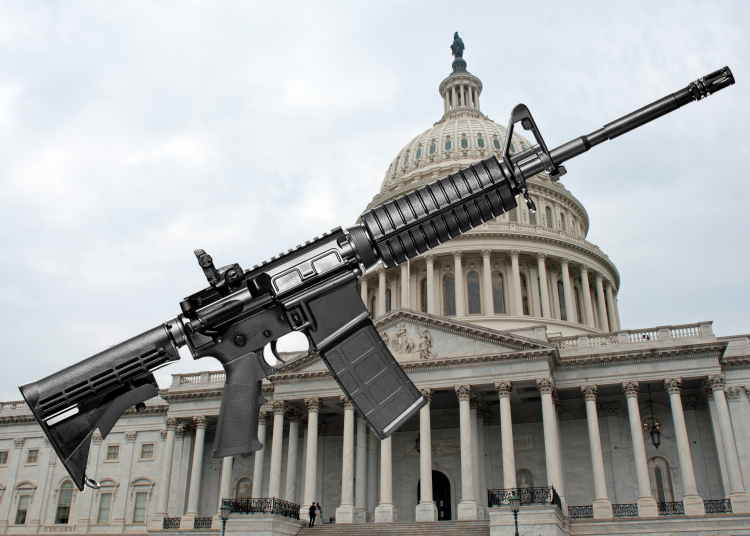WASHINGTON – The U.S. House of Representatives passed an “Assault Weapons” Ban along primarily partisan lines 217 to 213 on Friday.
The term “assault weapons” is a politically charged term that the Associated Press Stylebook recently stated, “Avoid assault rifle and assault weapons, which are highly politicized terms that generally refer to AR-or-AK style rifles designed for the civilian market, but convey little meaning about the actual functions of the weapon.”
They encourage the use of the term “semiautomatic rifle.”
The bill defines an “assault weapon” as a semiautomatic rifle that can accept a “detachable ammunition feeding device” and has one of the following features:
- A pistol grip
- A forward grip
- A folding, telescoping, or detachable stock
- A grenade launcher
- A barrel shroud
- A threaded barrel
The ban also includes semiautomatic rifles with a fixed ammunition feeding device able to accept more than 15 rounds unless it has “an attached tubular device designed to accept, and capable of operating only with, .22 caliber rimfire ammunition.”
The ban includes any component that can increase the rate of fire of a semiautomatic rifle or pistol.
Also banned are semiautomatic pistols with an ammunition feeding device that is not a fixed ammunition feeding device and has one of the following:
- A threaded barrel
- A second pistol grip
- A barrel shroud
- The capacity to accept a detachable ammunition feeding device at some location outside the pistol grip.
- A semiautomatic version of an automatic firearm.
- A manufactured weight of 50 ounces or more when unloaded.
- A buffer tube, stabilizing brace or similar component protruding horizontally behind the pistol grip.
The ban also includes semiautomatic shotguns that have a capacity of more than five shells and has one of the following:
- A folding, telescoping, or detachable stock
- A pistol grip or bird’s head grip.
- A forward grip.
- A grenade launcher.
Shotguns with a revolving cylinder are also banned under the bill. The bill also lists manufacturers and weapons included in the ban.
The bill does not impact current owners of weapons listed in the ban. Supporters state the ban will reduce “mass shootings” and critics point out the man is primarily focused on cosmetic features that do not impact the function of the weapon.
U.S. Rep. Cindy Axne, D-Iowa, was the only member of Iowa’s U.S. House delegation who voted in favor of the bill.
“As a mother of two, I can’t sit idly by as I watch children get shot while attending school, watching a movie, going to church, a concert, or while they’re just trying to have fun. And as a fifth-generation Iowan and as someone who has previously overseen fishing and hunting licenses at the Iowa Department of Natural Resources, I know how important it is to folks who use guns responsibly to continue to have the right to hunt and practice,” she said in a released statement. “The assault weapons ban I voted on today will not take any guns away from law-abiding owners, but will help keep some of the most dangerous weapons off of our streets. The assault weapons ban was in place prior to 2004, and research found that mass-shooting fatalities were 70 percent less likely to occur during the federal ban period. It’s imperative, for the safety of our kids and communities, that this legislation is signed into law.”
U.S. Rep. Ashley Hinson, R-Iowa, blasted the bill.
“Instead of focusing on the root causes of violence and legitimate solutions to prevent it, House Democrats rushed ahead with legislation that would unfairly target law-abiding Americans and ban commonly owned firearms. I will always stand up for Iowans’ Second Amendment rights and against the Left’s attempts to demonize lawful gun owners, while advocating for legislation to increase mental health resources, bolster school security, and support law enforcement,” she said.
The U.S. had a similar “assault weapons ban” from 1994 to 2004. Studies have shown it made little impact on overall rates of gun-related homicides. While two studies point to a decline in mass shootings, a review of four studies stated, “Limited data from 4 studies on the effects of the federal assault weapons ban (in effect from 1994 to 2004) do not provide evidence that the ban was associated with a significant decrease in firearm homicides.” The research is, in reality, inconclusive with studies having conflicting results.
The U.S. Senate is not expected to pass the bill.














